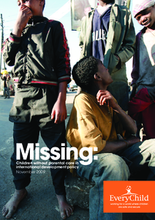20 years on from the adoption of the UN Convention on the Rights of the Child (UNCRC), evidence suggests an alarming lack of progress in achieving children’s fundamental rights to grow up in a loving family environment. Research, particularly from less developed regions, shows a substantial and growing number of children without parental care, with devastating impacts on children’s rights. In recognition of this problem, child rights activists have campaigned for the 20th anniversary to coincide with the agreement of UN guidelines aimed at preventing family separation, and ensuring appropriate care for girls and boys who are without parental care.
The full implementation of these guidelines is urgently needed as governments, and many of those working in international development, are not doing enough to address the pressing problem of children without parental care. EveryChild has made a strategic decision to focus all of its work on this vulnerable group. This paper draws on EveryChild’s programs in 17 countries, and on an extensive literature review and consultations with over 400 children. It argues that children without parental care must be mainstreamed, rather than missing from the international development agenda.
A lack of attention to this vulnerable group means that there is an incomplete statistical picture of the number of children without parental care. The figures on some categories of children without parental care that do exist suggest that there are at least 24 million children without parental care globally, or 1% of the child population. Where there are more detailed country and regional level statistics, a much more alarming picture is presented. Alarmingly, research suggests that the number of children without parental care is on the increase.
The growing number of children without parental care has worrying implications for efforts to achieve the rights outlined in the UNCRC. Of course, the impacts of a loss of parental care on these rights vary enormously by factors such as age, gender and level of disability and the living situation of the child. Overall, children without parental care are safest in family-based alternatives to parental care, such as fostering or kinship care. As long-term residential care can cause developmental delays, and expose children to violence and abuse, it should generally be used as a last resort, and only when proven to be in the best interests of the child.
A loss of parental care does not always harm children, and can give girls and boys an opportunity to escape abusive relationships, receive love and support from extended family members, attend school or earn incomes needed to survive. However, all too often, a loss of parental care in the developing world is not the result of well thought out strategies to protect children, but instead due to parents and children having to make agonizing choices about whether to stay together, or have enough to eat, or gain access to basic services.
The growing number of children without parental care affects developing countries disproportionately. The negative impacts of a loss of parental care also threaten the achievement of the Millennium Development Goals, with wide reaching and long-term ramifications for international development. For example, children without parental care are more vulnerable to malnutrition and long-term poverty, less likely to attend school and more likely to die young or suffer from maternal and reproductive health problems in adolescence. Despite the importance of this issue to international development, evidence suggests that not enough is currently being done to address this pressing problem. There is a lack of investment in social protection measures for vulnerable families, and limited recognition of a need to recognize the specific needs of children without parental care in such interventions. This means that some existing social protection measures are inadvertently increasing the number of children without parental care. There is also widespread continued support for residential care and juvenile detention, and a general lack of investment in child protection and alternative family-based care for children who cannot be with their parents.
In order to effectively respond to the absence of a loss of parental care on the international development agenda, it is essential to take a holistic approach to the problem. The growth of a loss of parental care is caused by a complex array of factors, including household poverty, violence, abuse and neglect in the home, a lack of access to good quality education and health care close to home, and inappropriate policies which support the institutionalization or detention of children. To address these root causes, and to protect children already without parental care, it is therefore necessary to engage individuals and agencies working in a range of sectors including social protection, child care reform and child protection services, education, health care, justice, trafficking and migration.

